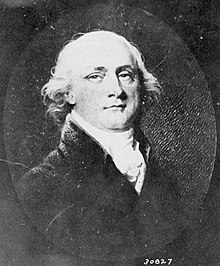John Francis Mercer
John Francis Mercer (May 17, 1759 – August 30, 1821) was an American lawyer, planter, and politician from Virginia and Maryland.
John F. Mercer | |
|---|---|
 portrait by Robert Field, 1803 | |
| 10th Governor of Maryland | |
| In office November 10, 1801 – November 13, 1803 | |
| Preceded by | Benjamin Ogle |
| Succeeded by | Robert Bowie |
| Member of the U.S. House of Representatives from Maryland's 2nd district | |
| In office March 4, 1793 – April 13, 1794 | |
| Preceded by | William Hindman |
| Succeeded by | Gabriel Duvall |
| Member of the U.S. House of Representatives from Maryland's 3rd district | |
| In office February 5, 1792 – March 3, 1793 | |
| Preceded by | William Pinkney |
| Succeeded by | Uriah Forrest |
| Personal details | |
| Born | May 17, 1759 Stafford County, Colony of Virginia, British America |
| Died | August 30, 1821 (aged 62) Philadelphia, Pennsylvania, U.S. |
| Resting place | Cedar Park Estate, Galesville, Maryland |
| Nationality | American |
| Political party | Anti-Federalist (1782), Federalist (1801) |
| Spouse(s) | Sophia Sprigg |
| Residence | Anne Arundel County, Maryland |
| Alma mater | College of William and Mary |
| Occupation | Lawyer |
| Military service | |
| Allegiance | |
| Rank | |
| Unit | 3rd Virginia Regiment Virginia militia |
| Battles/wars | American Revolutionary War Battle of Brandywine (WIA) |
Life
.jpg)
Mercer was born in 1759 at Marlborough, in Stafford County in the Colony of Virginia, to John Mercer and Ann Roy Mercer. He graduated from the College of William and Mary in 1775 and was a delegate for Virginia to the Continental Congress in 1783 and 1784. He married Sophia Sprigg on February 3, 1785.[1]
During the American Revolutionary War, Mercer was commissioned a captain in the 3rd Virginia Regiment in the Continental Army. He was wounded at the Battle of Brandywine. In 1778 he became an aide-de-camp with the rank of major to General Charles Lee. He resigned from the army when Lee did, but reentered the war as a lieutenant colonel in the Virginia militia. He served briefly under Lafayette in Virginia and was present at the siege of Yorktown.
After the war, Mercer moved to Anne Arundel County, Maryland, and was a Maryland delegate to the Philadelphia Convention in 1787, but withdrew before signing the Constitution. He would represent Maryland in the United States House of Representatives from the second and third districts from 1792 to 1794, and served as the tenth Governor of Maryland from 1801 to 1803. Illness plagued Mercer in his later years, and went to Pennsylvania to seek medical attention. In August 1821 Mercer died in Philadelphia, Pennsylvania.
He was the brother of George Mercer and James Mercer. Margaret Mercer was his daughter.
Notes
- William and Mary College Quarterly Historical Magazine, XVII, College of William and Mary, July 1908, p. 90
External links
- United States Congress. "John Francis Mercer (id: M000645)". Biographical Directory of the United States Congress.
- Mercer biography at the University of Groningen, Netherlands
| U.S. House of Representatives | ||
|---|---|---|
| Preceded by William Pinkney |
U.S. Congressman from Maryland's 3rd District 1792–1793 |
Succeeded by Uriah Forrest |
| Preceded by William Hindman |
U.S. Congressman from Maryland's 2nd District 1793–1794 |
Succeeded by Gabriel Duvall |
| Political offices | ||
| Preceded by Benjamin Ogle |
Governor of Maryland 1801–1803 |
Succeeded by Robert Bowie |